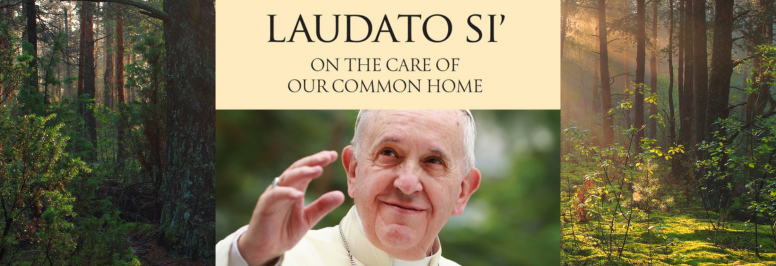By John Andrews
It’s one thing to be momentarily moved by some lines in an encyclical, apostolic exhortation, or even one of the Pope Francis’s many memorable quotes given in media interviews.
It’s quite another when his words begin to change your daily decision-making. Such is the case for me with Laudato Si, his 2015 Encyclical on Care for our Common Home.
Two years into his pontificate, it was already clear that Francis was laying new paths for us to follow. With Laudato Si he placed our Church squarely in the discussion of the state of the planet and the role of human beings in its degradation. Confrontational, poetic, science-based, mournful, prayerful and ultimately inspiring, this document connected so many dots for me between my faith, the ecology and the cause and effect of human behaviors on all forms of life. The big takeaway is that while God created us in His image and likeness, we are but a part of a vast web of life, all with inherent dignity and importance in His design. All these forms of life that God has made are interdependent. When one suffers, we are all affected. Sound familiar? (1 Corinthians 12:12-27).
Francis often decried a “culture of indifference” among believers to issues like poverty, war and, in Laudato Si, the environment. It forced me to confront my own indifference to the suffering of the planet, and my brothers and sisters in far corners of the world who are already bearing the terrible brunt of human impact on the environment. After a while, I found myself doing things like turning off the lights in my office when I left for meetings or stopping when I went to pull paper towels to dry my hands in the restroom and asking myself, “do I really need to do this? Can’t I just deal with having a little moisture on my hands for a few minutes until they dry naturally?” I had reached the point where I was connecting my use of paper towels every time I wash my hands with the image of that grotesque island of floating garbage in the Pacific Ocean that is now twice the size of Texas. This may sound trivial, or even laughable, but I share it to show that the teaching of our Pope had penetrated my daily behaviors. That’s critical to making change.
Laudato Si has also become central to me as a minister of the Church. I joined our diocesan committee to promote the teachings of Laudato Si, I’ve chaired it for the last four years. I’ve been inspired to work with our bishops, Bishop Gerald Barnes first, and now Bishop Alberto Rojas who have placed a strong local emphasis on living out Laudato Si.
I must admit that this work has sometimes led to what a former Laudato Si Committee member called “holy anger” because many in our faith communities persist in indifference to the call of the Holy Father to care for God’s creation. Some charge that this is the Church being political. Many are understandably distracted with the stresses and pressures of daily life and are unable to reflect on what is probably the ultimate “big picture” issue.
Pope Francis uses the powerful metaphor of weeping throughout Laudato Si, encouraging us to hear the cry of the earth and the cry of the poor at the damage we have done to the planet. Let us find in our hearts the courage to acknowledge this ecological suffering and to allow the conversion of our hearts so that we can truly “til and keep” our earth as God calls us to do. In this we can honor the legacy of Pope Francis.
John Andrews is the Vice Chancellor of the diocese and Editor of the Inland Catholic BYTE.
